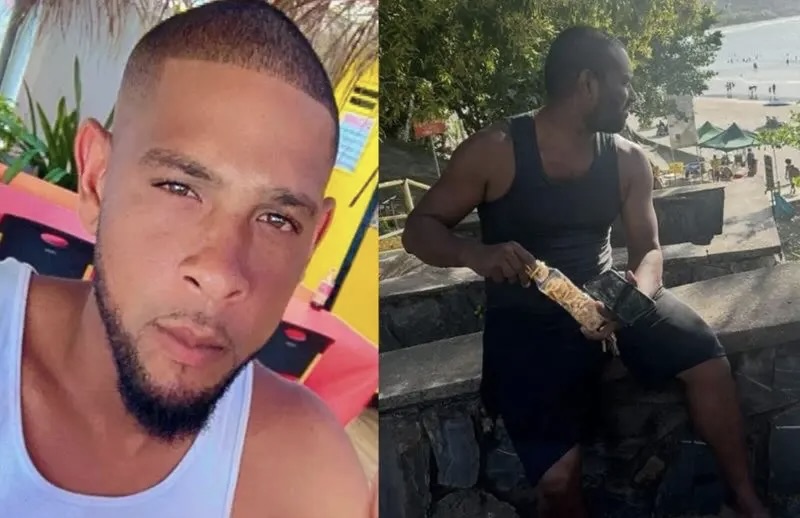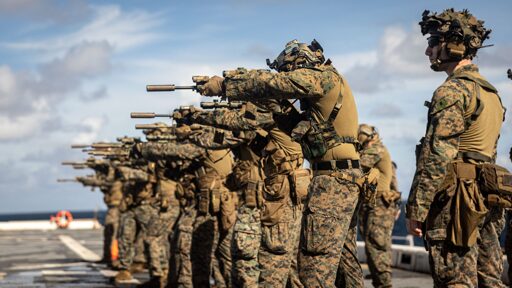Two Trinidadian fishermen were among the six victims of the US military’s fifth airstrike on a boat in the Caribbean. The White House again claims the boat was linked to drug trafficking, but has not provided evidence. Since the October 14 attack, Trump has confirmed three other strikes, raising the death count of what many are calling “extrajudicial killings” of Caribbean people by the US to at least 30, since the aggression began in September.
Lenore Burnley, the mother of one of the Trinidadian victims, identified as Chad Joseph, assured local media outlet Guardian News that her son was not involved in drugs.
“I find it wrong,” said Lenore Burnley, whose son’s killing has left her without closure. She said she has received no evidence or official word of her son’s murder, only secondhand reports.

Trinidadian citizens Chad Joseph and Rishi Samaroo have been reported killed in the October 14 US airstrike in the Caribbean. Photos via Alba Ciudad
“It’s not right. The sea law is they supposed to stop the boat and intercept it, not blow it up like that,” she said.
CARICOM divided as popular resistance grows
After the first US missile strike on a boat on September 2, Trinidad and Tobago’s Prime Minister, Kamla Persad-Bissessar, welcomed the US aggression in her region.
“I have no sympathy for traffickers; the US military should kill them all violently,” Persad-Bissessar declared in a statement.
The growing divergence between popular sentiment and the official policy of some heads of state has been highlighted by grassroots leaders and activists in the region, especially as the aggression escalates.
“Unfortunately, CARICOM is divided again on this situation with regards to the military aggression,” said Kandis Sebro, of the Assembly of Caribbean People Trinidad & Tobago, speaking to Peoples Dispatch.
The Caribbean Community and Common Market (CARICOM), the organization that represents 20 Caribbean islands and is responsible for coordinating foreign policy, and improving the economic and social well-being across the region, sent a letter to US Secretary of State Marco Rubio in early September. They asked for advance warning and consultation about the US military buildup, but are reportedly still awaiting a response.
“The threat is not just imminent – it is here,” Sebro asserted.
People of the Caribbean are pushing for “CARICOM to come together and take a stance with regards to what is affecting all of us” because they have not taken a “strong stance” on the aggression thus far, she said.
Meanwhile, the US is actively trying to deepen security cooperation with the nations of the region. Commander of US Southern Command (SOUTHCOM) Navy Adm. Alvin Holsey, who abruptly announced his departure from the position on October 17 amid reported tensions with US Secretary of War Pete Hegseth, visited Antigua and Barbuda and Grenada this week, apparently seeking new military installments.
“They [US] have been rejected by a number of islands in the Caribbean, for their bases, but they have also been welcomed by others,” Sebro said.
Despite the official policy of some Caribbean heads of state, people and movements across the islands are raising their voices against the US military deployment and calling on CARICOM to protect the region’s status as a “Zone of Peace”.
Read More: Trump chooses war over diplomacy in the Caribbean
Caribbean peoples rise to defend “Zone of Peace”
The concept of the “Zone of Peace” dates back many decades, but was formalized and adopted by the Community of Latin American and Caribbean States (CELAC) and CARICOM in 2014.
The principle was born out of a painful history of foreign – particularly US – intervention in the region. These events include multiple US invasions of the Dominican Republic, the US invasion of Grenada, the decades-long US blockade of Cuba, the US Navy occupation of Vieques, Puerto Rico, the ongoing intervention in Haiti, and many others.
Rooted in the principles of respect for sovereignty, the peaceful resolution of disputes, and the rejection of foreign military, the “Zone of Peace” serves as a strong, unified commitment by both Latin American and Caribbean countries for regional cooperation and prosperity.
After the two Trinidadian nationals were killed, the Assembly of Caribbean People organized a region-wide “Day of Action in Defense of the Caribbean” on October 16. Over 15 islands held actions echoing the same demands.
Trinidad and Tobago
“The sovereignty of the Bolivarian Republic of Venezuela must be respected,” proclaimed David Abdulah, political leader of the Trinidadian socialist party Movement for Social Justice (MSJ) and member of the regional executive committee of the Assembly of Caribbean People.
“We oppose any military intervention by the US or any other state in Venezuela,” he declared at a rally outside the US embassy in Trinidad on October 16.
He also condemned Washington’s history of crimes against humanity:
“The US has no moral authority to speak about narcotrafficking, when it was engaged in precisely such activity to finance the violent civil wars in El Salvador and Nicaragua in the 1980’s that resulted in many tens of thousands of people being killed. Nor does it have any moral authority to speak about peace, when it is complicit in the genocide of the Palestinians today, among many other crimes against humanity through the years,” Abdulah asserted.
The labor activist ended with an appeal to all those invested in peace to take a stand against war in the region:
“We call on our Caribbean sisters and brothers, including those in the diaspora, and all progressive and right-thinking social movements, civil society organizations, creatives, academics and others, political parties, and solidarity organizations to join this declaration in defense of our sovereignty, against aggression and the deployment of the military to our region, and for the Caribbean to remain a ‘Zone of Peace.’”
Barbados
“Our movement in Barbados totally objects to this kind of wild and indifferent behavior by the president of the United States of America,” said David Denny, general secretary of the Caribbean Movement for Peace and Integration, speaking to Peoples Dispatch.
“We will continue to stand in solidarity with the government and people of Venezuela because Venezuela is a sister country in our region.”
Denny praised the efforts of Venezuela to support the poor across the region with programs like Petrocaribe, which supplied oil to Caribbean nations under a preferential payment system, the “Yes I Can” literacy program in partnership with Cuba, various regional healthcare initiatives, and more.
In an “Information and Solidarity Gathering” held at the Venezuelan Embassy in Barbados on October 16, Denny and others denounced the sustained US pressure on Venezuela and articulated a vision for regional peace and cooperation.
“This military force is not only a threat to the Venezuelan people but is also a threat to the Caribbean people,” emphasized Denny to the attendees at the gathering.
He called on all progressive forces, from Pan-Africanists and socialists to religious persons, to “condemn this military force in our region”.
“We are not a threat against anything. We have the right to defend ourselves and our sovereignty,” said Martha Ortega Peraza, chargé d’affaires of the Venezuelan Embassy in Barbados, as reported by The Nation Barbados.
Refuting the “War on Drugs” narrative, the envoy described the recent US missile strikes on boats as part of a long series of aggressions against the Bolivarian Republic, going back to the 2002 coup attempt, and including the ongoing economic sanctions, and frequent military posturing.
“We want to work in a diplomatic way, but if the only way to sustain our freedom is to fight for it, we will do it,” she said.
Denny told Peoples Dispatch that the Caribbean Movement for Peace and Integration “calls on CARICOM to take a firm position in defense of the Caribbean and to demand that the United States of America remove all of its military forces and nuclear weapons from our region, so that our region can remain a ‘Zone of Peace.’”
Jamaica
The Left Alliance for National Democracy and Socialism (LANDS), an emerging left movement in Jamaica, released a statement demanding that CARICOM take a stand against “the increasing militarization of the region” and asserted that the region needs leaders “who stand up for the people of our respective nations”.
“We do not have to look far back in history to see the damage that was done to Iraq or Afghanistan when Western powers and their allies intervened there,” the statement reads.
Read More: Trump’s military escalation against Venezuela repeats the Iraq War blueprint
LANDS continues: “How long will it be before the same country that floods the region with guns will deploy troops within our borders against our will, under the guise of fighting crime or some other narrative they construct?”
Detailing the US military’s crimes throughout the Middle East, the statement added:
“This is what we risk inviting to the Caribbean.”
The group criticized the island governments that claim to uphold “the principle of maintaining the Caribbean as a Zone of Peace” while also welcoming “a foreign country to deploy military hardware into the region and conduct extrajudicial killings against civilians.”
Grenada
In Grenada, a speakout was held in defense of the Caribbean as a “Zone of Peace”.
Speakers called on Grenada to join the growing clamor against the US aggression, proclaiming, “We are not a people of war, we are a people of peace!”
Protestors held signs that read, “No to Caribbean invasion” and “You dun destroy the Middle East leave us!”
Dominican Republic
The Dominican chapter of the Peoples Assembly of the Caribbean held a forum demanding that the Caribbean be protected as a “zone of peace and solidarity”.
“These recent moves by Trump and the United States are not surprising,” said Isabel Tejada, a leader with the chapter. She asserted that intervention has always been Washington’s policy.
“We know that in our country we have suffered this on two occasions, and that they always look for some pretext,” Tejada said.
“We have to lift our voices against this North American intervention that seeks to rob the resources and riches of Venezuela and we cannot allow that,” the activist continued.
“The Caribbean is a zone of peace and solidarity.”
Read More: When María Corina Machado wins the Nobel Peace Prize, “peace” has lost its meaning
In Cuba, thousands rallied on October 17 to support Venezuela against US interference. Many other islands held mobilizations or released statements of their own. And the Venezuelan people themselves have been consistently mobilizing, training, and protesting against US intervention.
Across Latin America, heads of state have also added their voices in support of the Caribbean’s sovereignty.
“The Venezuelan people are owners of their destiny,” said Brazilian president Luiz Inácio Lula da Silva, speaking at the opening of the 16th Congress of the Communist Party of Brazil (PCdoB) on October 16.
“It is not any president of another country who should opine on what Venezuela will be like.”
Gustavo Petro of Colombia, Miguel Díaz-Canel of Cuba, Claudia Sheinbaum of Mexico, and others have also rejected US intervention in Venezuela, in addition to the most vocal opponent of the current US aggression, Venezuelan President Nicolás Maduro himself.
The people stand firm
Caribbean organizers and activists emphasize that the murder of two Trinidadian fishermen and dozens of others is not an isolated tragedy. The violence is a direct outcome of Washington’s expanding military presence and apparent hostility for Caribbean sovereignty.
While some governments continue to support the US agenda, the peoples of the islands are standing firm. From across the region, citizens demand that their governments reject US militarization. They are also urgently mobilizing their people into the growing movement.
Their call is clear: the Caribbean must remain a “Zone of Peace”, not only in name, but through collective resistance to foreign aggression and a renewed commitment to regional solidarity and cooperation.
The post As Trump wages war on the Caribbean, its peoples rise to defend peace appeared first on Peoples Dispatch.
From Peoples Dispatch via this RSS feed


